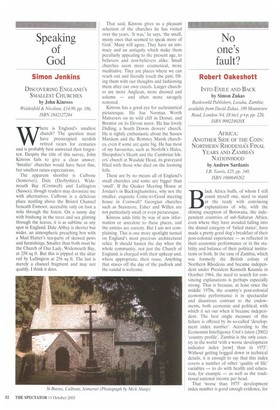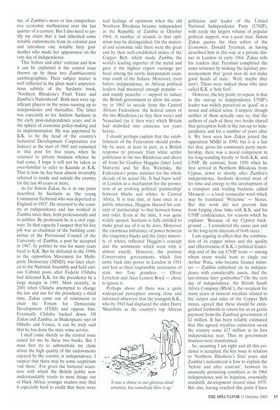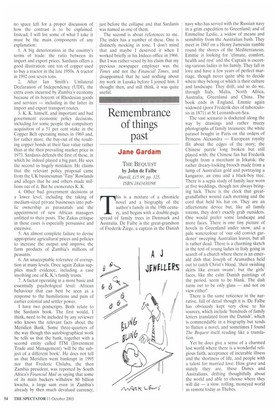No one's fault?
Robert Oakeshott
INTO EXILE AND BACK by Simon Zukas Bookworld Publishers, Lusaka, Zambia; available from David Zukas, 189 Mouniview Road, London N4, £8 incl. p+p, pp. 220, ISBN 998224020X AFRICA: ANOTHER SIDE OF THE COIN: NORTHERN RHODESIA'S FINAL YEARS AND ZAMBIA'S NATIONHOOD by Andrew Sardanis I.B. Tauris, £25, pp. 340, ISBN 1860649262 Black Africa buffs, of whom I still count myself one, need to stand at the ready with convincing explanations of why, with the shining exception of Botswana, the independent countries of sub-Saharan Africa, even where they have avoided falling into the dismal category of 'failed states', have made a pretty good dog's breakfast of their post-colonial experience — as reflected in their economic performance or in the stability and balance of their political institutions or both. In the case of Zambia, which was formerly the British colony of Northern Rhodesia and became independent under President Kenneth Kaunda in October 1964, the need to search for convincing explanations is perhaps especially strong. That is because, at least since the middle 1970s, the country's post-colonial economic performance is in spectacular and disastrous contrast to the endowments, both economic and political, with which it set out when it became independent. The best single measure of this failure is offered by its so-called 'development index number'. According to the Economist Intelligence Unit's latest (2002) 'country profile', Zambia is the only country in the world 'with a worse development indicator index inow] than in 1975'. Without getting bogged down in technical details, it is enough to say that this index covers a number of other 'quality of life' variables — to do with health and education, for example — as well as the traditional national income per head.
That 'worse than 1975' development index number is good enough evidence, for me, of Zambia's more or less comprehensive economic malfunction over the last quarter of a century. But I also need to justify my claim that it had inherited some notable endowments from its colonial past and introduce one notable fairy godmother who made her appearance on the very day of independence.
This 'before and after' contrast and how it can be explained is the central issue thrown up by these two Zambiacentric autobiographies. Their subject matter is well reflected in the plain man's unpretentious subtitle of the Sardanis book, 'Northern Rhodesia's Final Years and Zambia's Nationhood'. Both men were significant players in the years running up to independence and thereafter. The latter was especially so for Andrew Sardanis in the early post-independence years and in the sphere of economic policy-making and its implementation. He was appointed by K.K. to be the head of the country's Industrial Development Corporation (or Indeco) at the start of 1965 and remained in that post for five years, when he returned to private business whence he had come. I hope it will not be taken as over-familiar to refer to Kaunda as K.K. That is how he has been almost invariably referred to inside and outside the country for the last 40 years or more.
As for Simon Zukas, he is at one point described by Sardanis as 'the young Communist firebrand who was deported to England in 1953'. He returned to the country at independence and has worked in Zambia since then, both professionally and in politics. By profession he is a civil engineer. In that capacity I suspect that his key job was as chairman of the building committee of the Provisional Council of the University of Zambia, a post he accepted in 1967. In politics he was for many years loyal to K.K. But he defected in the 1990s to the opposition Movement for Multiparty Democracy (MMD), was later elected to the National Assembly and held various Cabinet posts after Federic Chiluba had defeated K.K. for the presidency by a large margin in 1991. Most recently, in 2001 when Chiluba attempted to change the law and run for the presidency a third time, Zukas came out of retirement to chair the Forum for Democratic Development (FDD) and oppose him. Eventually Chiluba backed down. Of Zukas and Zambia, as Shakespeare says of Othello and Venice, it can be truly said that he has done the state some service.
I shall come shortly to the central issue raised for me by these two books, But I must first try to substantiate my claim about the high quality of the endowments enjoyed by the country at independence. I suspect that there may be some scepticism 'out there'. For given the battered weariness with which the British public now understandably reacts to most things out of black Africa, younger readers may find it especially hard to credit that there were real feelings of optimism when the old Northern Rhodesia became independent as the Republic of Zambia in October 1964. A number of strands in that optimism may be distinguished. On the material and economic side there were the great and by then well-established mines of the Copper Belt, which made Zambia the world's leading exporter of the metal and gave it the highest export earnings per head among the newly independent countries south of the Sahara. Moreover, even before independence, its African political leaders had mustered enough popular — and mainly peaceful — support to induce the British government to allow the country in 1963 to secede from the Central African Federation: the federal union of the two Rhodesias (as they then were) and Nyasaland (as it then was) which Britain had midwifed into existence ten years before.
I should perhaps explain that the establishment of the Federation should probably be seen, at least in part, as a British response to pressure from white settler politicians in the two Rhodesias and above all from Sir Godfrey Huggins (later Lord Malvern) and Sir Roy Welensky, the Federation's prime minister for the whole decade of its actual life. It had been 'sold' in London as a mechanism for the promotion of an evolving political 'partnership' between blacks and whites in Central Africa. It is true that, at least once in a public utterance, Huggins likened his concept of 'partnership' to that between horse and rider. Even at the time, it was quite widely quoted. Sardanis is fully entitled to make good use of it as he does. Moreover the enormous imbalance of power between the (majority) blacks and the (tiny) minority of whites reflected Huggins's concept and the sentiments which went with it almost exactly. However, the postwar Conservative governments, which first came back into power in London in 1951 and had as their responsible secretaries of state two Tory grandees — Oliver Lyttelton and Alan Lennox Boyd — chose to ignore it.
Perhaps above all there was a quite widespread perception among close and informed observers that the youngish K.K., who by 1963 had displaced the older Harry Nkumbula as the country's top African politician and leader of the United National Independence Party (UNIP), with easily the largest volume of popular political support, was a good man. Simon Zukas quotes the then editor of the Economist, Donald Tyerman, as having described him in this way at a private dinner in London in early 1964. Zukas tells his readers that Tyerman completed the same sentence by making the lapidary pronouncement that 'good men do not make good heads of state'. Well, maybe they don't. There were indeed those who later called K.K. a 'holy fool'.
However, the key point, to repeat, is that in the run-up to independence UNIP's leader was widely perceived as 'good' in a moral and ethical sense. I suspect, though neither of them actually says so, that the authors of each of these two books shared that perception both in the run-up to independence and for a number of years after it. We have seen how Zukas joined the opposition MMD in 1990, but it is a fair bet that, given his communist party membership, there was a moral component in his long-standing loyalty to both K.K. and UNIP. By contrast, from 1950 when he first arrived in Northern Rhodesia from Cyprus, down to shortly after Zambia's independence, Sardanis devoted most of his time and energy to the development of a transport and trading business, called Mwaseni — a local vernacular word which may be translated 'Welcome' — Stores. But this work did not prevent him from forging close links with K.K. and his UNIP confederates, for reasons which he explains: 'Because of my Cypriot background ... I considered the cause just and in the long-term interests of both races.'
I am arguing in effect that the combination of its copper mines and the quality' and effectiveness of K.K. 's political leadership and of the top UNIP team — among whom many would want to single out Arthur Wina, who became finance minister — Zambia embarked on its independence with considerable assets. And the last-minute fairy godmother? On the very day of independence, the British South Africa Company (BSAC), the recipient for many years of mineral royalties related to the output and sales of the Copper Belt mines, agreed that these should be extinguished forthwith in return for an ex gratia payment from the Zambian government of £2 million. It has been reliably estimated that this agreed royalties extinction saved the country some £17 million in its first independence year. Thus its government finances were transformed.
So, assuming I am right and all this evidence is accepted, the key issue in relation to Northern Rhodesia's final years and Zambia's nationhood is how to explain the 'before and after contrast', between its unusually promising condition at its 1964 independence and its hopeless, essentially standstill, development record since 1975. But alas, having reached this point I have no space left for a proper discussion of how the contrast is to be explained. Instead, I will list some of what I take it must be the main components of any explanation: 1.A big deterioration in the country's terms of trade: the ratio between its import and export prices. Sardanis offers a good illustration: one ton of copper used to buy a tractor in the late 1950s. A tractor in 1992 cost seven tons.
2. After Ian Smith's Unilateral Declaration of Independence (UDI), the extra costs incurred by Zambia's economy because of its boycott of Rhodesian goods and services — including in the latter its import and export transport routes.
3. K. K. himself, and important and bad government economic policy decisions, including for some people the compulsory acquisition of a 51 per cent stake in the Copper Belt operating mines in 1969 and, for rather more, the buy-out of the resulting copper bonds at their face value rather than at the then prevailing market price in 1973. Sardanis defends the first of these, in which he indeed played a big part. He sees the second as hugely mistaken. He claims that the relevant policy proposal came from the UK businessman 'Tiny' Rowlands and alleges that he and others made millions out of it. But he exonerates K. K.
4. Other bad government decisions at a lower level, including the taking of medium-sized private businesses into public ownership as parastatals and the appointment of new African managers unfitted to their posts. The Zukas critique in these cases is especially persuasive and extensive.
5. An almost complete failure to devise appropriate agricultural prices and policies to increase the output and improve the farm products of Zambia's millions of peasants.
6. An unacceptable tolerance of corruption at many levels. Once again Zukas supplies much evidence, including a case involving one of K. K. 's family trusts.
7. A factor operating at a more basic and essentially psychological level: African behaviour that can best be seen as a response to the humiliations and pain of earlier colonial and settler power.
I have two postscripts. Both relate to the Sardanis book. The first would, I think, need to be included by any reviewer who knows the relevant facts about the Meridien Bank. Some three-quarters of the way though this autobiographical work be tells us that the bank, together with a second entity called ITM (Investment Trade and Management) 'will be the subject of a different book'. He does not tell us that Meridien went bankrupt in 1995 nor that Frederic Chiluba, the then Zambia president, was reported by South Africa's Financial Mail as saying that some of its main backers withdrew 80 billion kwacha, a large sum even in Zambia's already by then much devalued currency,
just before the collapse and that Sardanis was named as one of them.
The second is about references to me. The index has a number of these. One is distinctly mocking in tone. I don't mind that and maybe I deserved it when I worked briefly in his Indeco office in 1966. But I was rather vexed by his claim that my previous newspaper employer was the Times and not the Financial Times, and disappointed that he said nothing about my work in Lusaka before I joined him. I thought then, and still think, it was quite useful.




















































































 Previous page
Previous page